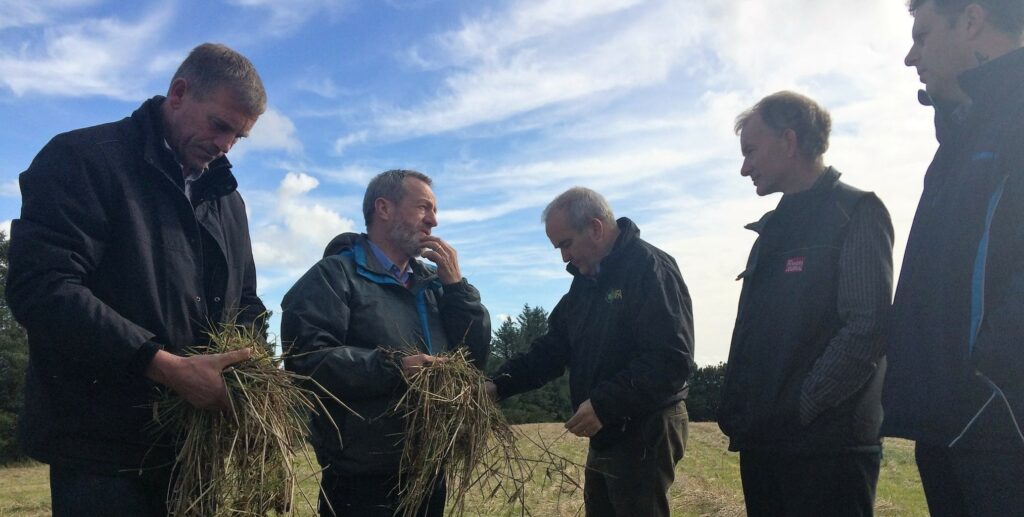
Fertile soil, a temperate climate and a rich farming culture combine to reinforce Ireland’s status as one of the EU’s strongest agricultural regions. In the current political and economic climate, the Irish agricultural sector faces great challenges. With the right support on a European and national level however, I believe that this industry can halt its perceived decline and become a thriving sector in our economy.
I see the need for an increased number of anaerobic digesters in Ireland and an opportunity for Irish farmers to exploit carbon farming with the right government support, and I have been active in working towards achieving these key matters.
Ireland stands to benefit immensely from new opportunities and innovation in the agriculture and agri-food sectors. In my work, I strive to ensure that Irish farmers get the most out of the reformed Common Agricultural Policy (CAP). I also want to see the the nature and level of inspections are sufficient (but not over burdensome), live exports preserved, and the family farm and rural Ireland protected.
Threat from climate change, rising energy costs, food security and rural decline tend to hinder the potential of Ireland’s agricultural sector. Thankfully, this is where membership of the European Union largely plays in our favour. Through the CAP, we may coordinate with the 27 other Member States in order to build sustainable and effective policies which tackle issues of common concern.
Under the CAP reform of 2014-2020, the Irish farming sector received €10.7 billion in European investment. Moreover, membership of the EU enables Irish farmers to reach markets way beyond our shores. For example, our combined agri-food exports to the countries outside of the UK and EU in 2022 were worth over €5.6 billion.
The new CAP strategy 2023-2027 paves the way for a fairer, greener and more performance-based CAP. It seeks to ensure a sustainable future for European farmers, provide more targeted support to smaller farms, and allow Ireland greater flexibility to adapt measures to our local conditions.
The European Green Deal places agriculture and rural areas at its core, and the CAP 2023-27 is instrumental in achieving the goals outlined in the Farm to Fork and biodiversity strategies.
Efforts to reduce emissions are of great significance in the agriculture sector because the natural processes associated with food production result in emissions of some greenhouse gases, particularly methane and nitrous oxide. I know that Irish farmers are making huge strides to reduce emissions, in line with the excellent research done by Teagasc, and are contributing to European efforts to confront the climate change challenge whilst maintaining the sustainability of this sector.
The Nature Restoration Law aims to restore 20% of damaged land and sea areas in the EU by 2030, and all ecosystems by 2050. This law is part of the EU Biodiversity Strategy which is a key element to the European Green Deal. Facing catastrophic damage to habitats and biodiversity, with 81% of habitats in poor status and 1 in 3 bee and butterfly species in decline, legislation to halt and reverse the destruction of nature was vital and urgent. Restoring nature must be done in a way that maintains the economic viability of Irish farms.
Carbon farming is a holistic approach that seeks to sequester carbon dioxide from the atmosphere and store it in our soils. It aims to reward farmers for reducing emissions and increasing carbon sequestration.
Reducing negative carbon emissions from forests, agricultural practices while increasing innovative technical solutions will help reduce the concentration of CO2 in the atmosphere and stabilise the world’s temperature increase. There is huge potential for carbon farming in Ireland, which can play a big role in the industrial sector’s decarbonisation while offering new income opportunities for farmers.
I was delighted to see the European Parliament in November 2023 vote overwhelmingly for the Carbon Removal Certification Framework, an important initiative advancing carbon farming. I recognise the challenges faced by farmers in Ireland and Europe in accessing carbon markets due to the absence of authorized tools for measuring, reporting, and verifying emission reductions on farms. To overcome this obstacle, the European Commission has proposed the Carbon Removal Certification Framework. The certificates will serve as proof of high-quality carbon removal.
We need to ensure that farmers receive fair compensation for their contribution to carbon sequestration, and that the benefits are equitably distributed. Collaboration between the agricultural sector and other stakeholders, such as the forestry industry and environmental organizations, is crucial for developing comprehensive strategies and fostering innovation.
Carbon farming not only mitigates climate change but also improves soil health, increases biodiversity, and strengthens the resilience of our farming communities.
Anaerobic digesters can provide Ireland a route to achieving our climate ambitions by decarbonising the sector, but the network needs significant development. Anaerobic digesters transform methane-emitting agricultural wastes into green energy to power both machinery and premises and digestate to restore soils. I have called for a government strategy to address barriers for anaerobic digester deployment on numerous occasions over the last few years, but it is positive that around 20 large-scale anaerobic digesters will now be built by 2025, and up to 200 by 2030. It is certain that anaerobic digesters are farmers natural allies in managing the new rules under the Nitrates Directive.
I have engaged at EU level on a number of occasions with regards to the concerns of landowners from Ireland South and the impact of conservation rules for Hen Harriers. I brought this matter to the attention of the European Commission, noting serious difficulties local farmers are experiencing in carrying out agricultural work on their land due to the European Union’s Birds Directive, which offers conservation protection through the Hen Harrier Special Protection Areas Designation.
This designation was introduced to halt the declining population of Hen Harriers, which are mostly found in Counties Limerick, Clare, Kerry, Tipperary and Laois. However, many farmers have been adversely impacted by the terms of the designation. I am mindful that farming in these areas is the source of income which many families are dependent on, so it is of the utmost importance that these concerns are heard at EU level, where the conservation rules are drawn up.
I have called for an immediate, co-ordinated approach across Government departments to ensure that farmers are compensated for their financial loss due to the designation of their lands. It is clear that a more comprehensive level of engagement is needed on such issues to ensure that local concerns are taken on board whilst natural habitats are protected without unnecessarily hindering or damaging people’s livelihoods.
As a result of my meeting with the Commission, it was clarified that rural development allows Member States to compensate farmers for costs and income loss resulting from the disadvantages and restrictions related to the implementation of Birds and Habitats Directives. This goes beyond the agricultural and environmental conditions and minimum agricultural activities set in the first pillar of the CAP.
In subsequent events, I welcomed Minister Simon Coveney’s, then Minister for Agriculture, efforts to accelerate work on the forestry aspects of the Hen Harrier Threat Response Plan. In addition to priority access for farmers with Hen Harrier land under the GLAS (Green Low Carbon Agri-Environment Scheme), Minister Coveney introduced further measures via the Locally Led Agri-Environment Scheme (LLAES) to cater for farmers who are farming large tracts of Hen Harrier Land. I continue to engage with Minister Coveney’s successor Michael Creed on this and various other issues of concern to Ireland South’s farming community
As Energy Committee’s rapporteur for the EPP on the 2030 climate targets, I have been working extensively on the Effort Sharing Regulation (ESR) for the period 2021 – 2030. This Regulation sets targets that cover all emissions except for large power plants and industrial installations, and is therefore relevant to the farming sector. From an Irish perspective, I have been working hard to ensure that provisions applying to the agricultural sector in particular prove both fair and effective.
Working alongside my colleagues in the ITRE committee, I endeavour to ensure that proposals in relation to emissions targets are balanced and pragmatic, evidencing consideration of national and/or regional circumstances. Ireland’s high share of agriculture in our energy mix must be taken into consideration. As one of the few MEPs who has committed to fighting for optimal solution for both Irish farmers and our climate targets, I will do my utmost to push for the necessary adaptations over the coming months.

We use cookies to improve our website and your experience when using it. Cookies used for the essential operation of this site have already been set. To find out more about the cookies we use and how to delete them, see our privacy policy.
